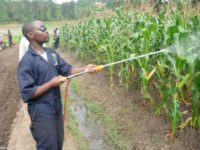 Nineteen African nations, members of the African Regional Intellectual Property Organization (ARIPO), began deliberatingon the highly contentious draft ARIPO Plant Variety Protection (PVP) Protocol on Monday, 29th June in Arusha Tanzania. (Protocol). Many of these nations are least developed countries, the poorest and most vulnerable countries in the world.
Nineteen African nations, members of the African Regional Intellectual Property Organization (ARIPO), began deliberatingon the highly contentious draft ARIPO Plant Variety Protection (PVP) Protocol on Monday, 29th June in Arusha Tanzania. (Protocol). Many of these nations are least developed countries, the poorest and most vulnerable countries in the world.
If adopted, the Protocol will establish a centralized plant variety protection (PVP) regime modeled on the heavily criticized 1991 Act of the International Union for the Protection of New Varieties of Plants (UPOV 1991). Such a PVPregime will vest enormous decision-making powers in the ARIPO PVP Office (which has no experience in PVP matters), and totally undermine the sovereignty of member states to regulate plant breeder’s rights. Crucially, the Protocol will nullify the rights of farmers to freely save, use, exchange and sell farm-saved seed and other propagating material. This practice is the backbone of agriculture systems in Africa, providing food and nutrition for hundreds of millions of Africans on the continent.
AFSA has been extremely vocal in challenging the legitimacy and credibility of the process leading to the development of the Draft Protocol as well as the Protocol itself. A particular concern highlighted is that the whole process of development of the Draft Protocol has been driven and influenced by the interests of foreign entities such as the UPOV Secretariat, the EU Community Plant Variety Office (CPVO), and the seed industry. These players are present at the current on-going deliberations on the Draft Protocol. AFSA’s request to participate as observers in the meeting was pointedly snubbed.This despite AFSA being a pan-African platform comprising of civil society networks and farmer organizations working towards food sovereignty in Africa, and representing millions of small-scale farmers.
These concernshave stimulated fierce debate among delegates and tensions are high. Several countries are pushing for major changes to articles ofthe Draft Protocol that relinquish national sovereignty and vests the ARIPO office with extensive draconian powers. They are questioning the credibility of the adoption of the Draft Protocol, in the absence of draft regulations that are linked to the Draft Protocol. These countries are also demanding that the adoption of the Protocol be deferred until member states have consulted widely at country levels.
Disappointingly Kenya, Ghana and Tanzania are supporting the agenda of foreign entities (UPOV and the EU CPVO) and are extremely hostile to any proposed changes being made to the Protocol, with Tanzania the host nation, exercising undue pressure on member states.
AFSA urges Kenya, Ghana and Tanzania to drop its opposition to revising the Draft Protocol as the it lacks legitimacy. AFSA also urges all ARIPO member states to urgently support calls to revise the Protocol to uphold the sovereignty of member states and promote farmers’ rights. The all importantfarmers’ rights remain heavily compromised with the draft revision text making no mention the rights of farmers to freely save, exchange, sow and sell farm saved seed of protected varieties.This has to change.
AFSA strongly urges Member states and the Ministers who will attend the Diplomatic Conference on Monday, not to adopt the Protocol. The lack of involvement of smallholder farmer groups and civil society in the development of the legal framework, the current compromised deliberationsas well as the Diplomatic Conference is a huge global concern.
AFSA further strongly urges member states and the Ministers who will attend the Diplomatic Confrence on Monday (6th July) to reconsider and overhaul the Protocol in its entirety. A credible process must be initiated to undertake evidence based discussions with all relevant stakeholders in particular with smallholder farmers with regard to appropriate legal systems for breeders’ and farmers’ rights as well as the upholding of national sovereignty and interests.





